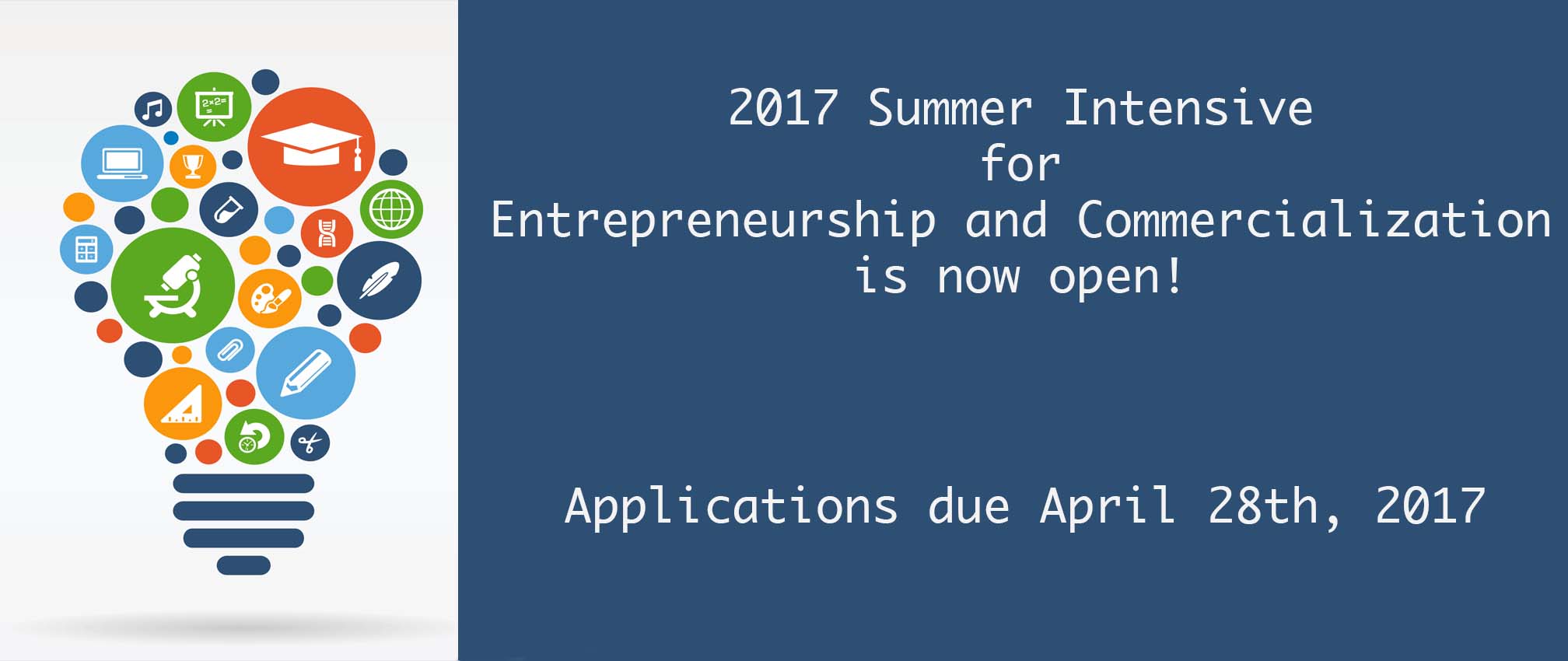2017 Summer Intensive for Entrepreneurship and Commercialization

This summer, the BRET Office of Career Development is offering a short course for biomedical sciences (including biomedical engineering) and chemistry PhD students and postdoctoral fellows interested in learning fundamental business principles of commercializing a scientific innovation.
The 2017 Summer Intensive for Entrepreneurship and Commercialization is limited to 20 participants who will break into teams and develop a technology commercialization proposal and investment pitch. The course is ideal for trainees who want an introduction to the “language” of business, and trainees who are interested in entrepreneurship or a career in start-ups, technology transfer, business or consulting
About the Module
The Summer Intensive is a foundation course in innovation, entrepreneurship, and commercialization for PhD candidates and post-doctoral fellows who are interested in exploring careers as innovation-focused faculty, technology entrepreneurs, strategy consultants, or executives in technology-based firms.The course focuses on the critical issues facing the Chief Technology Officer (CTO) of a twenty-first century corporation, including the assessment of technological capabilities and opportunities, formulating a technical direction and strategy, designing and developing a product portfolio, and developing a business plan for presentation to investors.
The Intensive will combine the studio classroom model with a collaborative learning approach. The centerpiece of the module is a team technology strategy project. The technology strategy is a vehicle for integrating and demonstrating your understanding of the concepts developed in the course, and for applying these concepts to a real-world technology. At the beginning of the module, you’ll choose a technology of interest to you and form a team to build your technology strategy in stages over the summer, as each topic is introduced. The module will conclude with a mock investment pitch presentation.
Module dates and times: Mondays and Thursdays, 9:00 a.m. to 12:00 p.m., from June 4 to July 28, with a one-week break the week of July 4
Instructor: Dr. John Bers, Associate Professor of the Practice in Engineering Management
Module structure: Flipped classroom model: online lectures and course material are reviewed out-of-class so teams can use class time to discuss how course concepts apply to their innovation.
Cost: No cost to PhD students and postdoctoral fellows in the biomedical sciences or chemistry. This course was developed in 2015 with a pilot grant from Burroughs Wellcome Fund (PI: Dr. Kathy Gould, Associate Dean for Biomedical Sciences and Professor of Cell & Developmental Biology).
Eligibility: Open to biomedical sciences and chemistry postdoctoral fellows and PhD students who have passed their qualifying exams before June 2016.
Questions: Please contact Kim Petrie (kim.petrie@vanderbilt.edu), Director, BRET Office of Career Development
The module will meet Mondays and Thursdays, 8:30 a.m. – 10:30 p.m., June 15 – August 7, 2017, with a one-week break over July 4.
Module structure
Flipped classroom model: online lectures and course material are reviewed out-of-class so teams can use class time to discuss how course concepts apply to their innovation.
All participants in this module will receive a Certificate of Completion at the end. By including the Certificate of Completion for this module on your CV, you demonstrate an innovation mindset and knowledge of a framework for evaluating new technologies for commercial potential. It’s also a great conversation starter with prospective employers!
This module is designed to provide an efficient introduction to practical concepts and tools relating to commercializing new technologies. Participants can expect to spend 6 hours/week in class, and up to 4-5 hours/week for out-of-class readings and project research.
Course topics
| Week | Topics/Activities |
|---|---|
| 1
(6/15) |
|
| 2
(6/22) |
|
| 3
(6/29) |
|
| 4
(7/10) |
|
| 5
(7/17) |
|
| 6
(7/24) |
|
| 7
(7/31) |
|